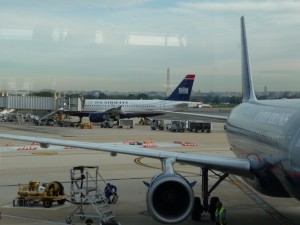
United Airlines and US Airways aircraft at Washington Ronald Reagan National Airport. (Photo by Daryl Osbrink)
By Nicholas Kralev
The Washington Times
November 24, 2008
Are you angry at yourself for buying a plane ticket for the holidays too early and the price is now lower? Do you even know whether the fare has dropped? Either way, you may be able to get some of your money back.
For years, travelers were warned against procrastinating when it comes to holiday trips, since conventional wisdom held that air fares usually get higher the longer you wait. But this year, wild swings in the price of oil and a global financial meltdown have shattered stereotypes about air travel.
Although many U.S. carriers have resisted lifting the fuel surcharges they imposed when oil was much more expensive, fares have been cautiously coming down of late. Almost all major airlines now have holiday sales that experts say are more generous than in previous years.
The main reason for that is demand for plane seats has shrunk faster than airlines have reduced their capacity. In many cases, the average fare between two cities around Christmas and New Year’s is lower now than it was a few months ago.
If you bought a ticket then, there is a good chance that it is cheaper now. Most airlines will refare your ticket and send you the difference in the form of a voucher, which you can use for a future flight for yourself or someone else.
“Re-faring is a good way to maintain customer loyalty,” said Greg Davis, a frequent flier from Arlington. “It’s a matter of finding time, though, because you have to watch the fares. For me, it’s only worth it if I’m going to get at least a $100 voucher.”
Travelers often wonder if they have to pay the penalty — usually $150 for a domestic ticket — for making changes to their flight. If you keep your original flights, you don’t have to pay the fee because you are not changing your itinerary. Your ticket still must be reissued to reflect the new fare, but most airlines don’t consider that a regular voluntary change. The fee applies, however, if you find a lower fare for a different flight, even if it’s on the same day.
Some of the biggest fare drops recently have occurred on tickets originating in Europe but issued in the United States. Even though those fares are published in euros or other currencies, they are converted in U.S. dollars before issuance, and the dollar is much stronger now than it was earlier this year.
Your chances for a successful re-faring are better if you bought your ticket directly from the airline — either on its Web site or on the phone. If you used a travel agency, you may encounter resistance to your request, since travel agents receive no compensation for the time spent reissuing your ticket and sending you a voucher.
As for online booking engines, re-faring policies can be inconsistent, and you have to deal with them, not the airline you are flying. Travelocity’s policy states that “if you find a qualifying lower rate for travel booked with Travelocity within 24 hours of booking, we’ll not only refund you the difference between what you paid and this lower price, but also give you $50 off a purchase of future travel.”
Another booking site, Orbitz, promises to send you a check, rather than a voucher, about a month after your trip. However, a fare drop is not enough to qualify for a refund. Another customer has to book your exact itinerary at a lower price. Because there is no way for you to know if and when that happens, Orbitz pledges to “start tracking” from the moment you buy your ticket “until the day you fly.”
New York traveler Dan Hammer recently discovered another way to save money on a ticket he had already purchased. He booked a business trip to Las Vegas on United Airlines, but his last meeting was canceled and he wanted to return home a couple of days early. The penalty to fly on a different day was $150, provided his initial booking class was available. That seemed a bit steep, so he did some sleuthing.
“I was surprised to see that one-way fares from Las Vegas to New York were as low as $136 on major carriers,” he said. He chose US Airways, because he could still credit the miles to his United frequent-flier account. The two airlines are partners in the global Star Alliance.
This column was first published by The Washington Times
